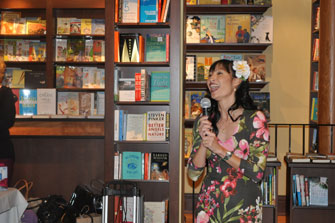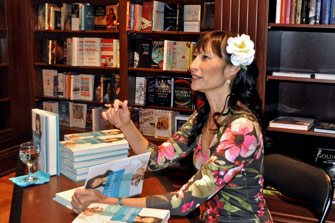January 07, 2013
Draws from grandmother’s example to minimize symptoms of the disease
Toronto, ON – A Toronto doctor who diagnoses Alzheimer’s disease and other dementias has a story to tell about the courageous people she’s met in her clinic and her own evidence-based plan to protect her cognitive health as she ages.
Dr. Tiffany Chow, 46, never worried about her own risk for Alzheimer’s disease. There was no history of the condition in her family – or so she thought – and she follows a fair number of healthy lifestyle choices.
A behavioural neurologist in the Sam and Ida Ross Memory Clinic at Baycrest Health Sciences, Dr. Chow has met and counseled hundreds of patients and their families through one of life’s most challenging journeys. Then came the unexpected curve ball – she realized that her own grandmother in Hawaii died of Alzheimer’s, but without the typical memory loss symptoms. With this revelation of a familial connection, Dr. Chow began to ponder the question, “Could I combat Alzheimer’s brain changes by building my cognitive reserve just like my grandmother?”
Trying to balance a busy professional career with raising a new family, regular exercise and outdoor activities that she’s always loved, she began to pay more attention to every aspect of her lifestyle to make sure she was doing everything possible to maintain and fortify her own cognitive health.
“There are many risk factors for dementia that are within your power to control, such as diet, cardiovascular exercise, maintaining a healthy weight to avoid obesity and diabetes, and, most notably, remaining socially integrated with others.” – Dr. Tiffany Chow
A chance meeting with a literary agent – who encouraged her to “write a book” that captures the stoic resolve and life lessons imparted by her patients and their families – started Dr. Chow on the path to penning The Memory Clinic (Penguin Canada). The book captures her patients’ and their caregivers’ inspiring stories mingled with her own unique perspective and healthy lifestyle practices that she hopes will thwart any Alzheimer’s brain changes into old age.
“I wrote this book for caregivers who are starting this difficult phase of life with dementia in a loved one and want to learn strategies for coping from those who’ve been down this road before,” says Dr. Chow, who is also a senior scientist with Baycrest’s world-renowned Rotman Research Institute.
“I also wrote the book for aging boomers who are worried about getting dementia and want to learn the best ways to reduce risk based on the latest available scientific evidence. Those of us working in the behavioural neurology field are, to a certain degree, self-interested. We want to avoid these brain diseases ourselves,” explains Dr. Chow, who faithfully adheres to regular exercise, the practice of loving kindness based on Buddhist principles, while struggling to stick to a low fat Mediterranean diet.
Buddhism offers teachings about compassion, wisdom and equanimity which all play a huge role in helping someone cope with tragedy, explains Dr. Chow. “They are very much in alignment with what works for caregivers and for healthcare professionals who are affected by their work with patients and families dealing with such difficult diagnoses on a daily basis,” she says.
Dr. Chow is matter-of-fact when talking about her own relationship to Alzheimer’s: “My grandmother had an atypical, low impact manifestation of Alzheimer’s disease, so I’m not just doing this clinical work as my job. I am scanning the latest scientific evidence to see what she did right and what I should change for myself. If what I’m learning can benefit others who want to protect their aging brains, then why not share it in a book?”
Three Do-It-Yourself appendices at the end of The Memory Clinic offer readers an evidence-based Cosmos-style quiz that calculates their risk for dementia, plus tips for reading health news headlines with a more critical eye and choosing an appropriate and safe experimental drug trial for a loved one with Alzheimer’s or other dementias.
The Memory Clinic will be available at major book retailers in January 2013.

